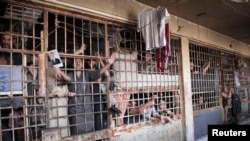A new Amnesty International report says survivors tell of the torture of tens of thousands of political prisoners in Syria.
The report also estimates more than 17,000 people died or were killed in Syrian military prisons between March 2011 and December 2015.
An uprising against Syrian President Bashar al-Assad began in 2011. This led to a civil war that continues today.
Charges in the report, called “It Breaks the Human,” were based on interviews with 65 torture survivors. Most witnesses told Amnesty they had seen at least one death while in prison.
Prison 'horror'
The Director of Amnesty International for the Middle East and North Africa, Philip Luther, called the report a “catalog of horror stories.”
“For decades, Syrian government forces have used torture as a means to crush their opponents,” Luther said. “Today, it is being carried out as part of a systematic and widespread attack directed against anyone suspected of opposing the government in the civilian population and amounts to crimes against humanity.”
Syrian authorities have denied the charges.
The report said that abuses increased at the start of the Syrian uprising. “…Anyone perceived to oppose the government is at risk of arbitrary detention, torture and other ill-treatment, enforced disappearance and death in custody,” it said.
Torture during interrogations
Most detainees told Amnesty they experienced torture and other ill-treatment during almost all interrogations. The torture described included beatings, electric shock, psychological abuse and other methods.
Amnesty Syria expert Claudia Scheufler helped put the report together. She said there is much more torture now than there was in the past.
“I was looking through one of our old reports from 1987. And the torture methods that we documented then are actually scarily similar to the ones that we have documented now, but obviously the scale has changed dramatically.”
Sexual assaults were also reported by men and women prisoners. Witnesses said some of the sexual violence happened during so-called “security checks” conducted on new detainees.
The report said many beating survivors were kept alongside others who died. Witnesses said guards kept wounded prisoners in cramped, unsanitary facilities with no medical care.
“[They were] hitting me everywhere… After they were done beating me with the wooden sticks, they took the cigarettes. They were putting them out all over my body. It felt like a knife excavating my body, cutting me apart,” said one witness.
A lawyer detainee told his story: “They treated us like animals. They wanted people to be as inhuman as possible… I saw the blood, it was like a river… I never imagined humanity would reach such a low level… they would have had no problem killing us right there and then.”
Nadim Shehadi, from Tufts University's Fletcher School of Law and Diplomacy, said the report tells of the Syrian government’s long and brutal history.
“For most Syrians, Palmyra prison was where the Syrian regime perfected torture. Where people were held in the thousands, where they were forgotten. And the saying in Palmyra was that the lucky ones were dead, because life was made so horrible by the brutality of the prison.”
Call for action
Amnesty urged the international community – specifically the United States and Russia - to put greatest importance on human rights abuses in any peace negotiations with Syrian authorities.
I’m Bryan Lynn.
Edward Yeranian reported this story for VOA News. Bryan Lynn adapted it for Learning English. Additional information came from the Associated Press. Jill Robbins was the editor.
We want to hear from you. Write to us in the Comments section, and visit our Facebook page.
________________________________________________________________
Words in This Story
catalog – n. a series of documented bad events
systematic - adj. using a careful system or method or done according to a system
perceived – adj. thought of in a particular way
arbitrary – adj. not based on a system of principles, unfair
interrogation – n. to ask someone a lot of questions, often with great force
unsanitary – adj. dirty, especially in a way that is dangerous to health
scarily - adv. done in a manner that causes fear
excavate – v. to dig into or make a hole
brutal – adj. extremely cruel, harsh or violent






